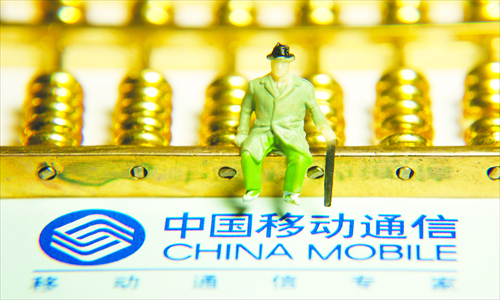HOME >> BUSINESS
The final cut
By Li Qiaoyi Source:Global Times Published: 2012-11-19 17:45:04

Those who are feeling the pinch right now might be relieved at the official reports of a downward trend in headline inflation. A slight drop in prices of telecommunications services is likely to be particularly welcome, given the country's huge number of mobile phone users.
In the first 10 months of the year, telecommunications services charges saw a drop of 0.1 percent over the previous year, the National Bureau of Statistics announced on November 9. This compares to a rise of 2.7 percent in the nation's consumer price index during the same period, according to the bureau.
China Mobile recently announced further cuts in international roaming fees, effective from November 1. The latest cut marked the eighth such move since 2010 by China Mobile, the world's largest mobile carrier in terms of subscribers.
The other two State-owned telecom operators, China Unicom and China Telecom, took similar steps earlier this year.
The fees are a topic of growing interest, given that the nation's mobile phone users numbered nearly 1.1 billion by the end of September according to the Ministry of Industry and Information Technology (MIIT).
But hopes for further reductions in mobile phone bills suffered a blow last week.
Speaking on the sidelines of the 18th National Congress of the Communist Party of China on November 10, Miao Wei, minister of the MIIT, was quoted by China National Radio as saying that after all the cuts in recent years, there is little room left for further price reductions.
No more reductions
Some analysts have taken a similar view, saying there is little leeway for the telecom operators to cut calling rates further.
"The charges for domestic calls are already at a low level, and reductions in international roaming fees will be smaller in the future," Fu Liang, an independent telecom analyst, said in a phone interview with the Global Times on November 13.
Telecommunications services charges have seen continuous drops since 2005, partly due to government calls for reductions in domestic roaming fees as well as for there to be one-way charges instead of charging the receivers as well for local calls.
During the 11th Five-Year Plan period (2006-10), the nation's telecom charges fell by more than 41 percent, according to the MIIT.
The charges fell by a further 5 percent over the course of 2011, the MIIT announced in February this year.
For the country's average consumers, however, further cuts in phone bills still make sense, especially for China Mobile's users.
Compared to its two smaller rivals, China Unicom and China Telecom, China Mobile charges slightly higher rates for mobile users.
"My monthly phone bill averages more than 100 yuan ($16.05), most of which is for calls," said Xiao Ni, a Beijing resident and China Mobile subscriber for nearly 10 years.
"I think it's still possible to reduce call charges, particularly for China Mobile," Xiao told the Global Times, noting that there should be cuts in both domestic call and international roaming fees.
But Fu said the telecom giant is unlikely to lower its call charges to the same level as its competitors, as it is still largely reliant on the traditional call businesses, having been slow to move into the booming mobile Internet sector.
Questions e-mailed to China Mobile about possible further cuts went unanswered by press time.
Cheaper future?
Economic Information Daily, run by the official Xinhua News Agency, reported on November 13 that government departments including the MIIT have stepped up efforts to launch pilot initiatives to allow private investors access to the telecom industry, which has long been monopolized by the three State-owned telecom heavyweights.
If private investment joins the sector, it will inevitably result in heightened competition, which would help to further lower mobile phone charges, said the report. The MIIT has yet to comment on the report.
But experts expressed doubts about the likelihood of any such initiatives being launched soon, and pointed out that there are certain difficulties for private capital in joining the sector. However, further cuts in mobile data traffic fees are possible.
"Telecom operators have become less motivated to cut charges for traditional telecom services such as call fees, and shifting to 3G services is a vital task for them," Xiang Ligang, chief executive of telecom industry information portal cctime.com, told the Global Times.
China Mobile posted net profit growth of 1.3 percent year-on-year in the third quarter, the slowest growth rate since the founding of the company in 2000, according to its latest quarterly fiscal report.
The company attributed the sluggish growth to its dependence on traditional call services.
Aiming for a larger slice of the country's mobile Internet market, the two smaller rivals to China Mobile both offer cheaper data traffic fees.
China Unicom introduced affordable mobile data packages that took effect from October 18 and are even cheaper than the fees charged by China Telecom, and the rivalry is set to grow more fierce.
China Telecom has not responded to Unicom's new package yet. "We have no plans for additional reductions in data traffic charges," Song Guixiang, a spokeswoman at the China Telecom public relations department, told the Global Times.
Mobile Internet services have also become more important to China Mobile user Xiao, who is considering upgrading to the use of the 3G network.
"I may change to subscribe to one of the other two telecom carriers, as their mobile data traffic fees appear far more attractive," she said.
Analysts believe that it won't be until the commercial launch of the 4G LTE network in China - which is not expected until late next year at the earliest - that China Mobile will make any further substantial reductions.
The company had nearly 700 million users at the end of September, continuing its dominance of the nation's telecom sector, but the challenge from its two rivals is growing.
Posted in: Insight